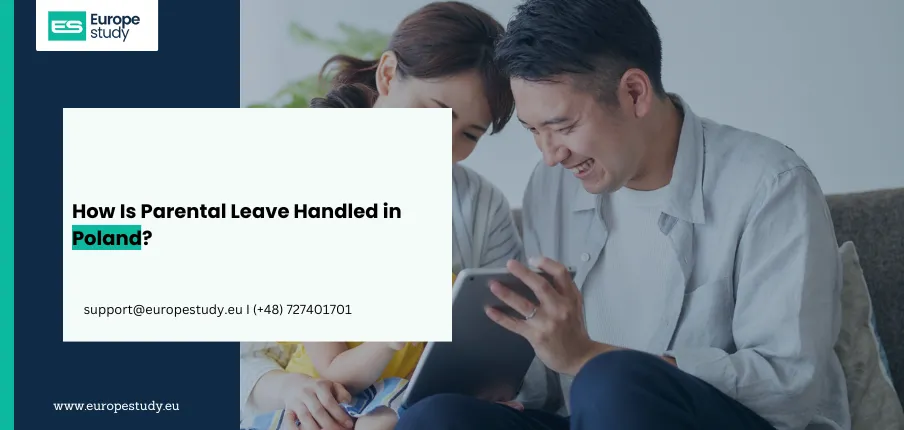
How Is Parental Leave Handled in Poland?
Parental leave in Poland is governed by well-established labor laws designed to support working parents, promote work-life balance, and encourage equal caregiving roles between mothers and fathers. If you're planning to work in Poland—or are already employed—it's essential to understand how maternity, paternity, and parental leave are structured.
This article will walk you through the types of leave available, eligibility criteria, payment structure, and recent updates to the law.
1. Types of Parental Leave in Poland
Polish labor law recognizes several forms of parental-related leave:
1.1 Maternity Leave (Urlop macierzyński)
- Duration: 20 weeks for a single birth (can be longer for multiple births).
- Compulsory Period: The first 14 weeks must be taken by the mother immediately after childbirth.
- Optional Transfer: After 14 weeks, the remaining 6 weeks may be transferred to the father.
1.2 Paternity Leave (Urlop ojcowski)
- Duration: 2 weeks.
- Eligibility: Available only to the father, must be taken within 12 months of the child's birth.
- Flexibility: Can be used as two separate one-week periods.
1.3 Parental Leave (Urlop rodzicielski)
- Duration: Up to 41 weeks for a single birth (or up to 43 weeks for multiple births).
- Shared: Can be shared between both parents.
- Use Period: Can be used all at once or in parts until the child turns 6.
- Recent Update: As of 2023, fathers are now entitled to a non-transferable 9-week portion of parental leave, aligning with the EU Work-Life Balance Directive.
1.4 Childcare Leave (Urlop wychowawczy)
- Duration: Up to 36 months.
- Eligibility: Available to parents with at least 6 months of employment.
- Purpose: Designed to care for a child up to the age of 6.
- Unpaid: This leave is unpaid but grants job protection.
2. Who Pays for Parental Leave?
- Maternity and paternity leave: Paid by the Social Insurance Institution (ZUS).
- Parental leave: Also covered by ZUS, depending on how it's taken:
- 100% of salary for the first 6 weeks if taken after maternity leave.
- 80% of salary if the entire leave (maternity + parental) is declared up front.
- The rest of parental leave is paid at 60% if not declared earlier.
3. Eligibility Criteria
- The parent must be employed under a Polish employment contract (umowa o pracę) or otherwise covered by ZUS insurance (including self-employed workers who pay into ZUS).
- Foreigners working legally in Poland with a work permit and ZUS contributions are also eligible for the same benefits.
4. Applying for Parental Leave
To apply for any of these types of leave:
- Notify your employer in writing within the required deadlines (often 21 days before the start of parental leave).
- Submit necessary documentation such as a birth certificate or medical proof.
- ZUS may require additional forms, especially for payments.
Employers are legally obliged to accept and process your leave application as long as it meets the criteria.
5. Can Parental Leave Be Combined?
Yes. In fact, most parents combine:
- 20 weeks of maternity leave
- Up to 41 weeks of parental leave
- Optionally followed by unpaid childcare leave (up to 36 months)
This means a parent could legally remain on leave for over 2 years, with portions of it paid and job-protected.
6. Recent Legal Changes and EU Alignment
In 2023, Poland introduced changes to align with the EU Work-Life Balance Directive, including:
- A non-transferable 9-week period of parental leave for each parent (use it or lose it)
- Greater encouragement for fathers to participate equally in child-rearing
- Enhanced flexibility in how leave is split and scheduled
7. Key Takeaways
- Poland offers generous parental leave options, especially when compared to many other European countries.
- Both parents can benefit, though the system historically favored maternal leave.
- Fathers are now being encouraged through non-transferable leave entitlements.
- Foreigners working legally in Poland with ZUS contributions are entitled to the same parental leave rights as Polish citizens.
8. Final Thoughts
Whether you're already living in Poland or planning to move there for work, understanding the parental leave system is crucial. It's one of the more family-friendly frameworks in the EU, and recent reforms signal an ongoing shift toward more equitable caregiving roles.
Make sure to check with your employer and local ZUS office for updates or assistance when applying for leave.





